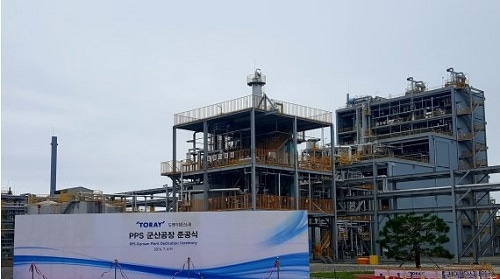Demand growth headed by auto electronics, electric and hybrid vehicles; resin suppliers boost capacity in response
November 22, 2016

According to consulting company Research & Markets (Dublin), the global polyphenylene sulfide (PPS) resin market was valued at $1.06 billion in 2015 and is projected to reach $1.85 billion by 2020, corresponding to a compound annual growth rate (CAGR) of 9.7%. In terms of volume, global consumption of PPS was 92,000 tonnes and is projected to reach 145,000 tonnes by 2020.
|
Toray Industries is among global suppliers of PPS who are adding capacity to meet burgeoning demand. |
Volume-wise, the automotive sector is the biggest consumer of PPS globally according to Research & Markets, with a market share of nearly 38% in 2015. Growth in this application is forecast at almost 6.3% (CAGR) in the short term. Auto electronics is the key application that employs PPS here, in components such as electronic control unit (ECU) cases and sensors. Under-the-hood applications are also growing, as well as power modules, inverters and alternators in electric and hybrid vehicles.
In Japan, the automotive sector accounted for 63% of overall demand of 27,318 tonnes in 2105 according to local industry publication Kagaku Keizai. The magazine pegged global PPS demand at 91,000 tonnes in 2015. Asia including Japan accounts for an estimated 74% of global demand.
Leading suppliers of PPS resin and compounds include Japanese firms DIC, Kureha, Polyplastics, Toray Industries and Tosoh. Others include Solvay Specialty Polymers, Celanese, and Shanghai Polygen Science and Technology.
A recent entrant to the fray is DSM Engineering Plastics, which formed a joint venture with China’s Zhejiang NHU Special Materials to manufacture compounds based on PPS polymer manufactured by NHU. The JV was formed in August this year.
For its part, Toray Industries completed an 8,600 tonnes/year PPS polymerization plant in South Korea in July this year, together with a 3,000 tonnes/year compounding facility. Toray also has 19,000 tonnes/year of polymerization capacity in Japan.
Another top gun in the PPS stakes, Japan’s DIC, is due to complete a 4,000 tonnes/year expansion at the end of this year, boost overall polymerization capacity to 23,000 tonnes/year.
PPS is a partially crystalline, high temperature performance polymer which exhibits exceptional chemical resistance, thermal stability, dimensionally stability, and fire resistance. Its extreme inertness toward organic solvents, and inorganic salts and bases make for outstanding performance as a corrosion-resistant coating suitable for contact with foods. Besides automotive, PPS also finds wide ranging application in electrical & electronics, healthcare, industrial, aerospace & defence, and industrial machinery.
About the Author(s)
You May Also Like





